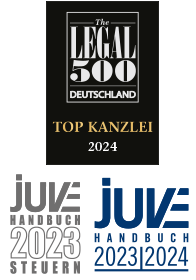Denial of input tax deduction even in the case of "unintentional" participation in VAT evasion in the supply chain
If an entrepreneur evades VAT within the supply chain, this can also lead to tax law sanctions and criminal tax law implications for the honest entrepreneurs in the supply chain. For example, this can result in the tax authorities refusing to allow the honest entrepreneur to deduct input tax - often completely unexpectedly - with reference to Section 25f of the German Turnover Tax Act (UStG). According to § 25f UStG, it is sufficient to "have to know" about VAT fraud at any point in the supply chain for the input tax deduction to be denied.
The dispute with the tax authorities all too often revolves around the question of which due diligence requirements the entrepreneur must fulfill so that he does not run the risk of losing the right to deduct input tax from his incoming invoices under § 25f UstG. Entrepreneurs subject to VAT are therefore well advised to observe the requirements of case law and the tax authorities in order to avoid the accusation of possible complicity or "should have known" of tax evasion.
1. Background of § 25f UStG - How VAT (carousel fraud) works
The aim of the provision in § 25f UStG is to combat VAT fraud, in particular in the form of so-called VAT carousel transactions. The functioning of VAT carousel transactions can be simplified as follows:
- As a rule, four entrepreneurs - at least two of whom collude to the detriment of the tax authorities - take part in the VAT carousel fraud. However, the VAT carousel can be extended to any number of participants. For reasons of simplification, however, the mode of operation will be illustrated here with only three (hereinafter: U1, U2, U3) participants.
- The "carousel" starts with U1, which is domiciled in another EU country. U1 is located in the immediate vicinity of the German border (e.g. in the Netherlands). U1 now sells goods for an example of EUR 100.00 net to U2 based in Germany, with whom U1 conspires. The delivery is VAT-exempt as a so-called intra-Community delivery.
- The U2 is also called "missing trader" because he is regularly not tangible for the tax authorities in the later course. In many cases, these are so-called letterbox companies. The - bad faith - U2 also delivers the goods for 100.00 EUR (and thus regularly very "cheap") plus 19.00 EUR VAT to the - good faith - U3.
- U3 is also based in Germany. He pays the 119.00 EUR to U2 and has the input tax of 19.00 EUR refunded by the tax office. He then delivers the goods for 110.00 EUR net (VAT-free as an intra-Community delivery) back to U1 in the Netherlands, whom he has (in many cases) already been named by U2 as an interested buyer.
- The "fraud" is now that U2 does not pay the VAT for his intra-German delivery to U3 to the tax office. In this way, he and U1, who cooperates with him, have a netted "gross profit" of EUR 9.00 (namely the VAT of EUR 19.00 collected by U3, but then not paid to the tax office, minus EUR 10.00 for the "increased" purchase price of U1 from U3).
- After U1 has received the goods from U3 at a price of EUR 110.00, he puts them back into circulation - again at a purchase price of EUR 100.00. In this way, one and the same goods circulate. In this way, one and the same good often circulates several times. In practice, we are often talking about sales tax amounts in the tens of millions that are lost to the treasury.
- The entrepreneur named in our example U3 is often completely unaware of this. U2 contacts U3 and offers him the goods at a very good price and "supplies" him with the suitable buyer (namely U1) at the same time. For the U3 this turns out to be a lucrative business and he unwittingly becomes part of the sales tax carousel.
Since the initiators of carousel transactions often act under the guise of bogus companies, they are difficult for the tax office to seize and the evaded sales tax is irretrievably lost for the tax authorities. To better curb these criminal structures, Section 25f UStG therefore expands the sanction-relevant behavior by holding all companies in a supply chain accountable by imposing increased due diligence requirements. The provision enables the tax authorities to recover the tax loss "elsewhere" or to pass it on to the recipient of the service.
In these cases, the tax office denies the input tax deduction by referring to § 25f UStG on the grounds that the entrepreneur (in this case U3) should at least have known that he was part of a VAT carousel fraud. The introduction of § 25f UStG has resulted in increased due diligence obligations for entrepreneurs in Germany. Only if the entrepreneur fulfills the corresponding due diligence obligations does he not run the risk of losing the input tax deduction retrospectively pursuant to § 25f UStG.
2. VAT disadvantages (for the U3) in case of "participation" in VAT evasion
If the entrepreneur is deemed to have participated in a tax evasion scheme, § 25f UStG provides for the mandatory legal consequence of the denial of the input tax deduction from incoming goods and services and the VAT exemption for intra-Community supplies. The entrepreneur concerned is thus penalized twice. In the above example, the inexperienced entrepreneur U3 would have to pay VAT to the tax office on his delivery to U1, even though he only collected the net payment in good faith for the VAT exemption of his delivery to U1. At the same time, he is denied the input tax deduction from the incoming invoice of U2.
The situation is further complicated by the fact that the ECJ ruled in its judgment of 24.11.2022 (C-596/21, - Finanzamt M) that the denial of the input tax deduction is not limited to the actual tax loss incurred. Rather, the input tax deduction is to be denied in its entirety.
All in all, the provision of § 25f UStG is a vehicle of the tax authorities, to which every entrepreneur involved in the supply chain is exposed to a risk that can hardly be overestimated - sometimes even threatening the existence of the business.
3 Prerequisites for sanctioning according to § 25f UStG
3.1 Positive knowledge or negligent ignorance
The starting point for sanctions under Section 25f UStG is positive knowledge or negligent lack of knowledge or the need to know of the VAT evasion of another trader at a preceding or subsequent stage of the transaction within the supply chain.
The gateway for the assumption of participation is often the accusation of knowing. To avoid this accusation, companies must comply with certain due diligence requirements when entering into and conducting their business relationships.
3.2 What are the indications for a "had to know" within the meaning of Section 25f UStG?
In addition to the case law of the BFH and the ECJ, the pronouncements of the Federal Ministry of Finance (BMF) serve as a guideline for the specification of the due diligence standard.
In its letter of June 15, 2022, the BMF lists examples of possible tax irregularities that require a more detailed review by the entrepreneur. Suspicions of VAT evasion can therefore arise from, among other things:
- Invitation to participate in transactions in which only the (potential) business partner determines the framework conditions of the sales transaction, e.g. by unilaterally determining the customer and purchase price,
- offering goods far below the market price,
- lack of industry knowledge, especially when offering large inventories of goods,
- Websites with superficial information on the product range and lack of contact details,
- Frequently changing contact persons in the companies.
4 Recommendations for practice
The following protective measures are particularly useful in practice:
Establishment or adaptation of internal control systems (ICS)
The establishment or adaptation of internal control systems serves as a shield against unintentional involvement in VAT evasion in supply chains. The basis for such a shield is the creation of a catalog of indications of VAT irregularities and possible prevention measures. Furthermore, training courses should be held to raise awareness among employees, especially in the operational area. An ICS helps affected entrepreneurs to be relieved of an accusation of "should have known" vis-à-vis the tax office.
Documentation of decision-making processes
Decision-making processes regarding the maintenance or initiation of business relationships should be precisely documented in order to be able to prove compliance with due diligence obligations to the tax office in case of doubt. Transparency and traceability of the decision-making process must have top priority in the event of suspicious circumstances.
LHP's VAT competence team will be happy to advise you on all issues relating to the complex VAT topic of "Input tax deduction in supply chains in the light of § 25f UstG". With reference to § 25f UStG, the tax office regularly puts forward the same arguments again and again in order to deny the entrepreneur the input tax deduction. Experience has shown, however, that these arguments can be refuted in the vast majority of cases, so that the entrepreneur retains the right to deduct input tax.
In summary, we offer the following services in particular:
- Support during tax audits, special VAT audits and VAT inspections
- Defense consulting or support and implementation of sales tax objection and lawsuit proceedings in connection with the denial of the input tax deduction by the tax authorities.
- "Advice for consultants": we are happy to provide selective support to tax consultant colleagues in connection with the complex material law subject matter of § 25f UStG. We are happy to provide written assurance of mandate protection.
- Implementation of internal control systems (ICS) and tax compliance management systems (TCMS)
- Holistic consulting together with our LHP experts in the field of criminal VAT law
Cologne
An der Pauluskirche 3-5,
50677 Cologne,
Telephone: +49 221 39 09 770
Zurich
Tödistrasse 53,
CH-8027 Zurich,
Telephone: +41 44 212 3535


